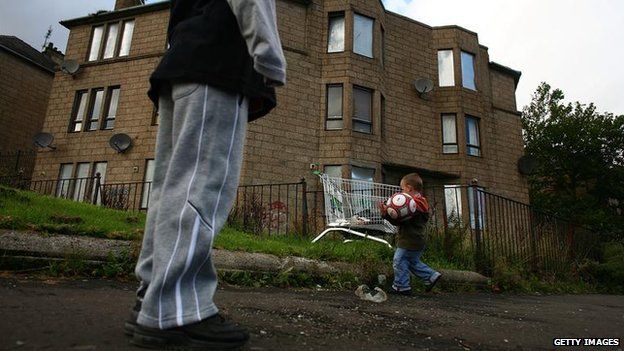Children's commissioner Tam Baillie renews austerity attack
- Published

Scotland's children's commissioner has renewed his attack on the UK government's proposed welfare cuts.
It comes after the Department for Work and Pensions said it made "no apology" for attempting to make work pay.
In a letter to newspapers, Tam Baillie claimed the proposals would impact life expectancy, educational attainment and mental health.
He was also critical of the decision to change the definition of child poverty.
The UK government said child poverty levels were at their lowest in Scotland for 30 years and that eradicating it completely remained an "absolute priority".
But the Scottish government called for a rethink of the proposals, while Scottish Labour claimed half a million children in Scotland could be affected if the Conservatives pressed ahead with cuts to tax credits.
Impact disproportionally
Earlier this week, the children's commissioners for Scotland, England, Wales and Northern Ireland warned in a report to the United Nations that government austerity measures had failed to protect the most vulnerable children.
The report said the £12bn of planned cuts, further details of which are expected to be set out by the Chancellor in next week's budget, would impact disproportionally on the 2.3 million children in the UK estimated to be living in poverty, and urged a halt to the policy.
In response, a spokesman for the Department for Work and Pensions said the UK government believed that the best route out of poverty was work, and that it "makes no apology for its efforts to raise incomes by expanding employment opportunities".
In his letter, Mr Baillie criticised the government's comments.
He wrote: "When the UK government says 'no apology', to me it means no apology for more children being plunged into poverty, no apology for them dying younger, no apology for their educational attainment being badly affected, and no apology for their poor mental health."
He said action was needed to make child poverty a "key focus" for the UK and devolved governments "as a matter of urgency".
Work and Pensions Secretary Iain Duncan Smith announced on Wednesday that the way child poverty was classified would be changed to reflect the "root causes" of poverty rather than simply the income of the family.
Currently, a child is defined as as being poor when it lives in a household with an income below 60% of the UK's average.
Responding to Mr Baillie's letter, a spokesman for the UK government said the number of children living in relative poverty in Scotland was at its lowest since the 1980s.
'Meaningful change'
He added: "Eradicating child poverty is an absolute priority for this government.
''The current child poverty measure is a poor test of whether children's lives are genuinely improving.
"Our new approach will focus attention on making meaningful change to children's life-chances that reflect our conviction that work is the best route out of poverty.
"With substantial tax-raising powers on the way to the Scottish Parliament, there will be scope to make greater decisions on spending in Scotland, whilst continuing to benefit from sharing the risks and resources with the rest of the UK."
The Scottish government spokesman said: "The shocking reality of the UK government's austerity agenda has led to unacceptable levels of child poverty in Scotland with 210,000 children now living in relative poverty after housing costs were paid.
"These figures are completely inexcusable."
Meanwhile, Scottish Labour said 296,000 families in Scotland would be affected by cuts to tax credits, including more than 522,000 children.
The party's MP, Ian Murray, said: "The coming Tory Budget looks set to hit working families the hardest, at the same time as the Chancellor is refusing to rule out yet another tax cut for millionaires."